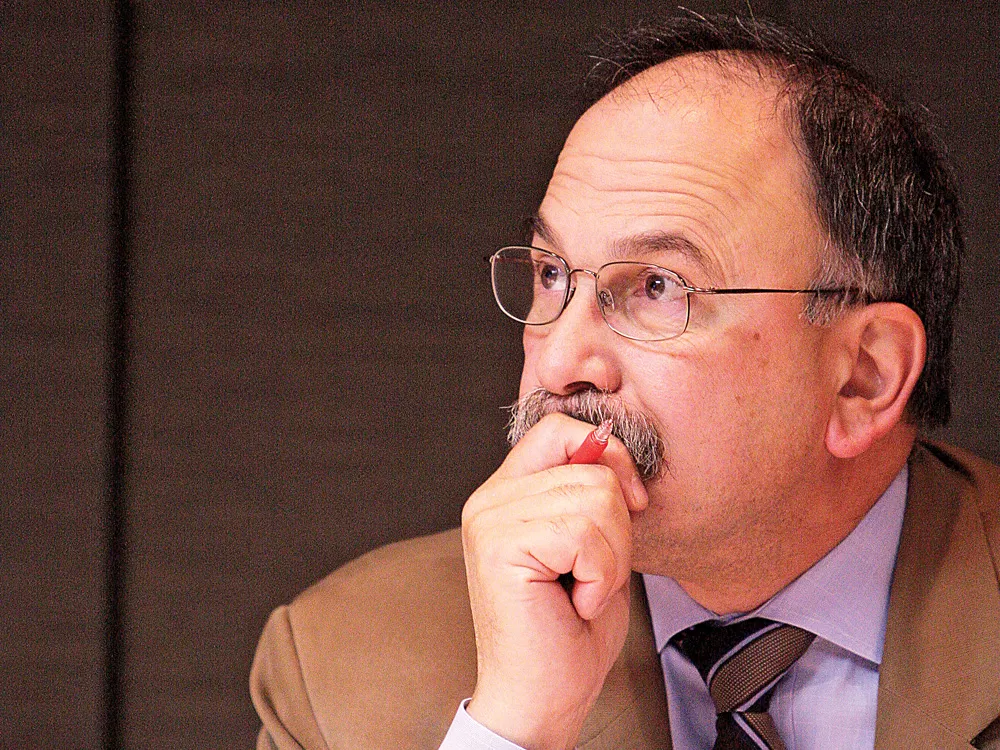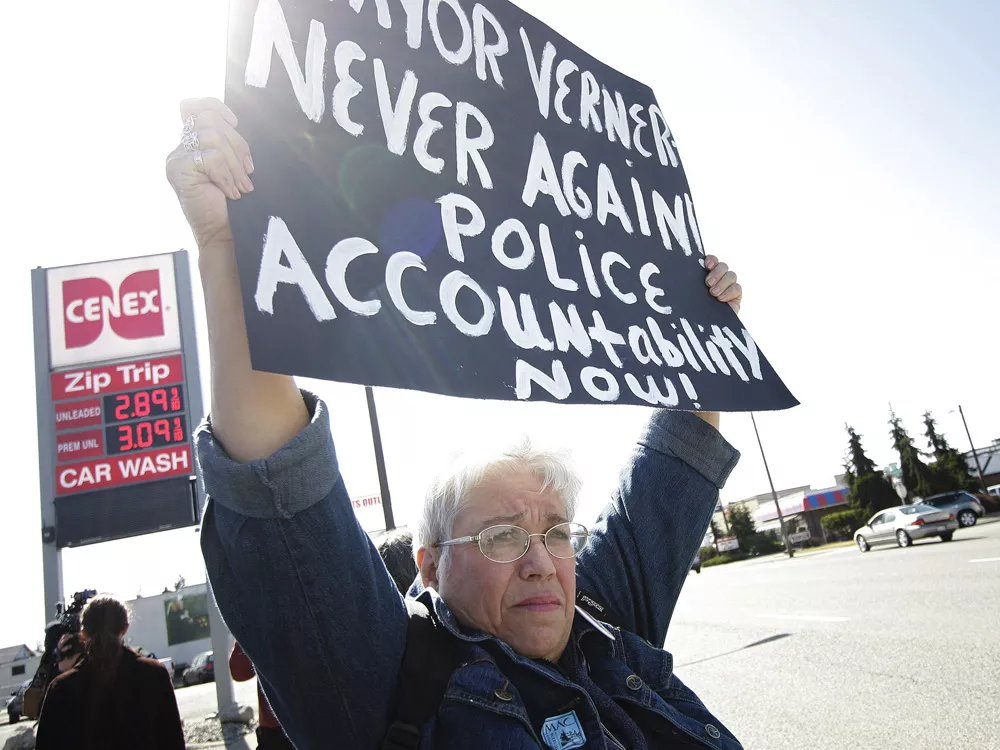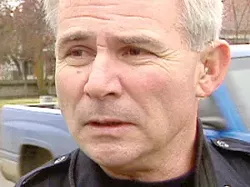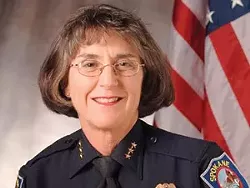
After Otto Zehm is beaten repeatedly with a police baton, after he’s hog-tied and shocked with a Taser, after he loses consciousness and turns purple, he is scooped off the floor of a Spokane Zip Trip and rushed to a hospital.
A half-hour later, the acting police chief, Jim Nicks, arrives at the convenience store and quickly grabs his phone.
He calls Rocky Treppiedi, the Spokane Police Department’s legal advisor and the city’s risk manager, court records state. Treppiedi heads to the Zip Trip and talks with Nicks, who then meets with reporters.
The story told that night — that Zehm “lunged” and “attacked” an officer — was a lie. But the Police Department, led by Treppiedi’s legal guidance, stuck to the story. Even after surveillance video surfaced showing Officer Karl Thompson hit Zehm 13 times without provocation. And even after Nicks changed his view of the encounter, saying Thompson violated the department’s use-of-force policies.
The federal criminal trial of Thompson begins this week and is expected to last five weeks or more. Thompson stands accused of using excessive force and lying to investigators. (The civil lawsuit filed by Zehm’s family is on hold until this trial is over.) Treppiedi, meanwhile, isn’t on trial, but his actions have attracted the ire of the federal government.
It’s certainly not the first time Treppiedi’s zealous defense of the city has brought unwanted attention. He was at the center of the Gypsy case in the mid-1990s, which resulted in a $1.43 million settlement in favor of Grover and Jimmy Marks. It was Treppiedi who served a pre-dawn search warrant on a CBS news team in town covering the case.
Treppiedi is also responsible for creating the policy to counter-sue virtually everyone who filed any suit against the city. He regularly lodges complaints against opposing attorneys with the state bar association, or threatens to. In the Zehm case, he launched a “shadow investigation,” inspiring an assistant U.S. attorney to write in court records that neither he nor other federal prosecutors had ever seen such tactics.
Repeated phone calls to Treppiedi, seeking comment, were not returned.
“In Rocky Treppiedi’s book, the police are always right,” says Pat Stiley, a lawyer who worked for the Marks family on the Gypsy case. “He has a knee-jerk loyalty to law enforcement … and anyone who questions law enforcement is unpatriotic and in bed with the devil.”
“Certainly, he is a strong personality,” says Gregg Smith, a lawyer specializing in business and commercial litigation, who also worked on the Gypsy case. “If anyone in community leadership doesn’t question that personality, that’s the playground for some of the problems.”
“Cop’s On Him”
On March 18, 2006, the sun set just a few minutes after 6 pm. Around that time, Otto Zehm was on his way to the store.
Zehm, a man of average build, was walking to the Zip Trip near Division Street and Nora Avenue to buy food. His long blond hair hung over his shoulders and on top of a leather jacket with too many zippers.
On his way, he swung by an ATM. Zehm was a janitor for Skils’kin, where he cleaned offices at Fairchild Air Force Base. He had a paycheck for $500 in his pocket. Two 18-year-old girls were at the drive-up ATM. One of the girls had already swiped her card and entered her PIN. She noticed Zehm standing near her car. He, almost unintelligibly, mentioned “something” about “$500” to the girls, court records show. They got scared and drove off.
The girls immediately called 911. They watched as Zehm “messed” with the ATM, thinking he was stealing. Dispatch put out the call, saying the suspect “ran south on Division with their money.”
Officer Karl Thompson was on a break at a police substation not a mile from Zehm and the girls. That night, the station was filled with other officers huddled around the television, watching Gonzaga dominate the University of Indiana in the NCAA basketball tournament. A win here would send the team to the Sweet Sixteen.
But Thompson didn’t care about the game, court records state. He’s from Los Angeles and lived in North Idaho. He heard dispatch’s call on the “suspicious circumstance” on his handheld radio, and checked his patrol car’s computer for details. Realizing he was nearby, he responded.
One of the girls remained on the phone, while dispatch relayed information to responding officers. At 6:17 pm, the dispatcher says, “The complainant thinks he appears to be high.”
Finished at the ATM, Zehm walked to the store, as he had done many times before. The girls were following him in their car, telling the 911 operator of his movements. Zehm smiled at the clerk and customers.
Outside, with no lights or sirens running, Thompson parked perpendicular to the gas pumps and ran inside.
As Thompson rushed into the Zip Trip, the girls described what they saw to the dispatcher, and doubts about Zehm’s alleged theft came out. But it was too late.
Complainant: “Yeah. The cop just ran into the gas station after him.”
Complainant #2: “Oh my God. They’re struggle… oh my God.”
Complainant: “Oh my… he’s like… yeah.”
Dispatch: “Uh, so now the complainant’s advising she’s not entirely positive that he did get her money.”
Complainant: “I think he’s getting arrested.”
Dispatch: “Are the officers out with him?”
Complainant: “Uh, they’re… the… one cop got out of the car and ran into the gas station. We’re outside the gas station. I guess they’re struggling. Yeah. He’s on the ground.”
Dispatch: “OK.”
Complainant: “Cop’s on him.”
Videos show Zehm, unaware of what he’s accused of, grab a two-liter Diet Pepsi and turn toward the candy display. It’s then that he sees Thompson, backs away and puts his arms up. Thompson strikes with a baton. Zehm backs away and Thompson strikes him again. Zehm falls to the ground and holds the two-liter up to protect his face and head. Thompson orders him to drop the bottle, drawing his Taser and firing.
Zehm, who was on his back, responds to the electric shock by twisting onto his stomach and crawling down the aisle. Thompson grabs him by his leather jacket and strikes him repeatedly with the baton.
On the ground, Zehm continues to struggle as Officer Steve Braun enters the store. Under Thompson’s orders, Braun strikes Zehm with his baton and stuns Zehm with his Taser. Thompson continues striking Zehm with his baton. More officers respond, eight altogether, to subdue and hog-tie Zehm.
Before losing consciousness, Zehm says, “I only wanted a Snickers.” He stops breathing. The acting police chief arrives, and, before long, so do reporters, cameras and questions.
Then Treppiedi shows up.
A Bulldog for the City
When Rocky Treppiedi arrived at the Zip Trip, he brought decades of experience.
Born and raised in New York City, Treppiedi earned a bachelor’s degree in criminal justice from his hometown’s John Jay College of Criminal Justice in 1975. Three years later, he had a law degree from Gonzaga.
He passed the bar on May 25, 1979, and was first hired by the city on July 1, 1981, where he’s worked his entire career but for a short hiatus a decade ago, when he joined a private law firm.
Almost right away, Treppiedi stepped into the role he still has today: advising and defending the Police Department.
Sheri Barnard was first elected to City Council in 1983, before becoming mayor in 1989.
“I think he’s an excellent, brilliant lawyer,” she says. “He’s got a lot of experience. He’s got a great family, love his wife. But I felt the whole time that I worked with him that he was quite powerful and biased. Biased in protecting City Hall, instead of the public.”
Barnard’s sharpest criticism of Treppiedi stems from his actions during the Gypsy case, which pitted the city and Police Department against Jimmy Marks and his large family.
In June of 1986, police raided Marks’ home and that of his father, Grover, looking for stolen items. Instead, they found and seized $1.6 million in cash and $160,000 in jewelry.
Over the next decade, the matter between the Marks family and the city dragged on. Charges were dropped and reinstated, and the raids were ruled illegal. In 1989, the Markses sued the city for $59 million. The city sued them back. In 1991, a District Court judge tried to settle the case, as did a mediator in San Francisco.
On June 18, 1997 — 11 years to the day after the raid — court-ordered negotiations began secretly in Yakima. Nine days later, the city agreed to settle out of court and pay $1.43 million to the Marks family. Mayor Jack Geraghty said the “settlement puts an end to one of the longest drawn-out legal battles ever faced by the city.”
“This literally was an opportunity for the city to get out from under the risks that it faces,”Treppiedi told the Spokesman at the time. Treppiedi was the city’s face in the battle against Jimmy Marks, who flamboyantly lit his cigar with a fake $1 million bill when the city settled. Marks later ran against Treppiedi for a school board seat.
During the Gypsy case, Pat Stiley, one of the Marks family lawyers, happened to be personal friends with the mayor, Sheri Barnard. When he was in City Hall, he would stop in to say hi to Barnard.
Treppiedi found out they were meeting, says Stiley, and “went bananas.”
“He presumed I was involved in unethical conversations [about the Marks case] with my friend, the mayor. I was not,” Stiley says. “I’ve never encountered anything like that. … His response — when he didn’t agree with you, or didn’t like something you did — was different than any lawyer I’ve met: He’d report you to the bar.”
Other lawyers involved in the Gypsy case say Treppiedi reported them to the state bar association as well.
More than 15 years later, Treppiedi threatened to use the same tactic in the Zehm case.
In June of 2010, the City Council was crafting an ordinance to strengthen the police ombudsman’s office by empowering it with greater independent investigative authority. Three Council members — Richard Rush, Amber Waldref and Jon Snyder — sought advice on the ordinance from Breean Beggs, a local civil-rights lawyer.
Since Beggs represents Otto Zehm’s family, Treppiedi demanded that he stop communicating with city leaders. Treppiedi asserted that Beggs had no right to speak to members of the Council because of his involvement with the Zehm family’s multimillion-dollar lawsuit against the city.
“Please cease immediately any and all contact with the City’s representatives, including elected officials … [or] I will have little choice but to forward this matter to the Washington State Bar Association as a formal complaint,” Treppiedi warned Beggs in a letter.
Another tactic Treppiedi used in the Gypsy case — countersuing people who sue the city — became a routine response by the city under Treppiedi. As the Spokesman explained in a lengthy article in 2007, the city would accuse people suing the city of “conspiracy to misuse the judicial process,” forcing them to hire lawyers to defend themselves, racking up a hefty legal bill and erecting financial hurdles. The article found that “countersuits are not filed routinely in the state’s other major cities, and lawyers for Spokane County said they rarely use the tactic.”
Mayor Mary Verner officially put an end to the practice in 2008.
“Yes, he’s a bulldog for the city,” Verner says of Treppiedi. “I have a fiduciary responsibility to defend the city. … And Rocky is a very good litigator when it comes to defense of the city.”
Even after the policy change, Treppiedi’s bulldog defense of the city continued.
In 2009 — three years after seeing the surveillance videos and a year after Nicks testified that Thompson used excessive force — Treppiedi continued to blame Zehm: “Any injury or damage suffered by Mr. Zehm was caused solely by reason of his conduct and willful resistance,” Treppiedi wrote Zehm’s attorneys.
Shadow Investigation
From the moment Nicks called Treppiedi on the night of the beating, Treppiedi became involved in almost every aspect of the investigation, court records show. In fact, the U.S. attorney working the case wrote in court documents that Treppiedi performed his own “shadow investigation.”
Treppiedi was there when police department officials watched for the first time footage recorded by the Zip Trip’s cameras, which shows no lunge or attack by Zehm. By Treppiedi’s order, the top brass was shown only two of the four camera angles available. When the media filed a public records request, Treppiedi handled it and disclosed only the two camera angles. Four months after Zehm’s death, Nicks learned of the two additional angles. The detective who led the investigation told Nicks that she assumed the “chain of command” had approved dismissing the other camera angles because “Rocky told [her] the [County] Prosecutor” approved it, records state.
Grant Fredericks, a forensic videographer, was hired by Treppiedi to look at the footage and prepare a report for the Police Department. When the U.S. Department of Justice stepped in to do its own investigation, it attempted to hire Fredericks for additional work. He, at first, did some work for them, isolating stills from the footage. But he also provided this work to Treppiedi, at Treppiedi’s request and without the knowledge of the federal government. When the U.S. attorney’s office learned of this, they told Fredericks that the work he did was confidential, that he couldn’t provide it to Treppiedi. Fredericks quit, saying he was “under contract” with Treppiedi.
As the federal investigation ramped up, a grand jury was formed. As witnesses from the Police Department and city were called to testify, the Justice Department learned that “Treppiedi was briefing and preparing most of” them. “Mr. Treppiedi also conducted post-[grand jury] testimony interviews,” read court filings.
The only investigation that should have been occurring at this time was by the federal government. But it wasn’t the only one. The Department of Justice “learned that Treppiedi was conducting an ‘investigation’ that appeared to ‘shadow’” its own activities, and those of the grand jury.
And Treppiedi would pass the information he learned during his investigation to Thompson and his attorneys. Treppiedi began reaching out to the federal government’s expert witnesses. U.S. attorneys asked him to stop, citing a “gag order” issued by Police Chief Anne Kirkpatrick to help “maintain the confidentiality and integrity of the DOJ’s investigation.” Treppiedi told them he wouldn’t stop, saying he wasn’t Kirkpatrick’s employee.
“During the past approximate 30 years,” a court filing says, “this is the first time that the target of a federal criminal and grand jury investigation has been provided seemingly direct access to and direct information about traditionally confidential grand jury proceedings.”
Days before a federal judge was going to rule on the conflict, the city split the legal team up. Treppiedi would no longer officially be involved in Thompson’s criminal trial, but he would defend the city against the Zehm family’s civil claim.
Assistant U.S. Attorney Timothy Durkin, who is heading Thompson’s prosecution and would not comment for this article, kept up the pressure, saying the conflict continued despite Treppiedi being pulled from the criminal case.
“Unfortunately, that doesn’t resolve the taint,” Durkin said to the judge. “It’s one thing to allow the skunk in … but the smell remains.”
Recently, Mayor Verner held a news briefing in which, instead of taking questions, she passed out a statement that said the “court found no issues of conflict or impropriety on the part of the City.”
The U.S. Attorney’s office immediately fired back, saying that a court has not “yet considered, reviewed, and/or addressed” the actions of any city attorney — including Treppiedi. Yet.
A Zealous Advocate
When asked about Treppiedi, a typical response by people that have known or worked with him usually contains the words “experienced” and “dedicated.” Whether this was good or bad was determined by who answered.
“Rocky took very seriously his role defending the Police Department,” says Milton Rowland, who worked with Treppiedi in the city attorney’s office from 1993 to 2007. Rowland has no direct role or knowledge of the Thompson trial, but he is representing the city on two different cases.
“The criticism that Rocky has gotten has been incredibly unfair, and it’s been personal,” Rowland says. “The city attorney’s office goal is to minimize liabilities. … He’s done a great job. He’s saved the taxpayers more money than anyone could count.”
Bob Allen was the investigative captain at the Police Department during the Gypsy matter. He says he brought Treppiedi in to work more closely with the department because he felt that “we needed more direct advice available to us.”
“I’ll tell you very frankly: I think it worked out excellent,” Allen says. “Rocky dealt with that very diligently and very transparently.”
But not everyone thinks Treppiedi’s devotion to police matters at the city has gone well.
“My clients expect more than zealotry. They expect practical solutions and compromise,” says Pat Stiley, a Marks lawyer, speaking about Treppiedi. If Treppiedi had gotten his way, Stiley adds, the story told on the night of the incident would never have been challenged. “Federal involvement made this see the light of day. … If it weren’t for federal involvement, nothing would have ever come out of this case.”
“I think he’s been there too long,” says Barnard, the former mayor, when asked about Treppiedi. “Is it necessary to defend the Police Department to the point where the rest of the citizens are put in a position to be afraid?”
Gregg Smith, another Marks lawyer, says city officials couldn’t fire Treppiedi if they wanted to. “He’s walking around with most of the [Zehm] case in his brain. He’s probably, at this moment, the most capable one over there.”
Councilwoman Amber Waldref, like most of her fellow Council members, wouldn’t comment directly on Treppiedi. But she says that in the two years she’s been on the Council, she’s felt powerless to affect the direction the city has taken on the Zehm matter.
“I do have concerns over how the Otto Zehm case has been handled. But you get a lot of information, you either have to take it or leave it,” she says. “I have to take it with a grain of salt: What [City Attorney] Howard Delaney tells me, what Rocky Treppiedi tells me. I’d like to believe it, I’d like to. I know [Nicks] said one thing, and then said another. I want to know why. … But until we have an independent citizen body to review this, then I’ll have trust. Then I’ll have the facts.”
Councilman Bob Apple, who has railed for reform at City Hall for years, has seen enough of Treppiedi.
“I would not allow him to be involved in representing law enforcement. If he violated that, he would be fired,” he says. “But that can only happen at the direction of the mayor.”
After eight years on the Council, Apple has come to the conclusion that many department leaders are “more concerned with cover-ups than telling the truth.”
So why hasn’t the mayor done more to make the Police Department transparent?
“That’s the million-dollar question. We knew there were problems before she got elected, we knew there were problems after,” Apple says. “Why haven’t we reviewed police-involved shootings? Why haven’t we released records [of internal investigations of police], as a recent Supreme Court decision told us to? Why, why, why?”
Comments? Send them totheeditor@inlander.com.
In the five years since his death, Otto Zehm has simply become a “36-year-old mentally ill janitor,” which he was, but for those who knew him, the media’s shorthand for Zehm leaves too much out of his story.
Zehm could blow you away on the guitar. Even as a teenager at North Central High School, Zehm developed a reputation as a talented musician. John Duplain remembers visiting Zehm’s house during high school to practice with him. “He could play ‘Eruption’ by Van Halen then — that’s a pretty high level of difficulty,” recalls Duplain, 42. “He was already, as far as I’m concerned, a master.”
Zehm was also a great worker. At Skils’kin, a nonprofit that provides employment opportunities for people with disabilities, he cleaned offices at Fairchild Air Force Base. “He did everything at the best of his abilities, always willing to learn a new task, more than willing to help his colleagues … just the kind of employee you’d want to have,” recalls Leona Eubank, his supervisor at the time.
Zehm was also remarkably generous with the little he had. During breaks at work, he’d regularly buy everyone on the cleaning crew something to eat — “a candy bar or anything else you wanted,” Eubank says. It was just something Zehm liked to do.
Zehm’s death also reminds former colleagues how vulnerable they are. Despite being diagnosed schizophrenic, Zehm could generally blend in and function in society, Eubank says, and for those who worked with him, that left a troubling message: “It scared them to think that if it could happen to Otto, it could happen to them just as easily,” Eubank says. “They still get upset and worried about it. That’s just part of their daily life now.”
Zehm will also be remembered for a lot of little things. How he always came to work with a two-liter of Pepsi and a gallon of milk. “He said it kept his hair shining and flowing,” Eubanks says. How, during high school, he’d sneak out for a smoke with his friend and drama class partner. “We’d do little skits and stuff,” recalls Bill Hartman. “We’d have to do improv, and he was really good, and I just sucked at it.” And how, when Eubank assigned Zehm to vacuum one of the endless hallways at Fairchild, she could hear him giggling over the vacuum. “Whatever he was thinking about at the time, I never asked,” Eubank says. “It was just nice to hear someone giggling.” (Jacob H. Fries)
Assistant Chief Jim Nicks, who was acting police chief at the time of Otto Zehm’s beating, has said he plans to retire from the department whenever Chief Anne Kirkpatrick leaves, which is expected to happen early next year.
The departure of the city’s top two police officials represents a massive loss of experience for a department struggling to rebuild relations within the community (to say nothing of the budget issues facing SPD, which recently announced it won’t investigate most property crimes).
Having a police chief with one foot out the door creates further uncertainty throughout a department, says Sheriff Ozzie Knezovich.
“You have to remember that Anne [Kirkpatrick] basically put everybody on notice, around January of last year, that this was her last year,” the sheriff says. “With that in mind, whenever you have a situation where your leadership is about to change, that does give a sense of a lack of continuity. … What’s next? Who’s going to be next?”
While the Zehm case doesn’t directly involve his agency, Knezovich says he increasingly faces questions from citizens upset about the Zehm case and the city’s response. “They are concerned, quite frankly, about the lack of information or cohesive information,” Knezovich says.
Nicks and Kirkpatrick declined to be interviewed.
In a brief phone interview this week, Mayor Mary Verner defended Kirkpatrick’s announced departure, saying the chief had indicated from the start that she would stay only about five years. The internal process to begin seeking her replacement has already begun, Verner says, and will speed up after the election.
Verner’s mayoral challenger, David Condon, says he personally pressed Kirkpatrick about her timing.
“I did ask her why she announced her leaving so early and, ‘Doesn’t it hurt command authority?’” Condon says. “It definitely undermines your authority and pretty much says, ‘Just wait it out.’”
Condon says that, if he’s elected, finding a new chief would be a top priority: “We need to build confidence back in our Police Department.” (Jacob H. Fries)



















